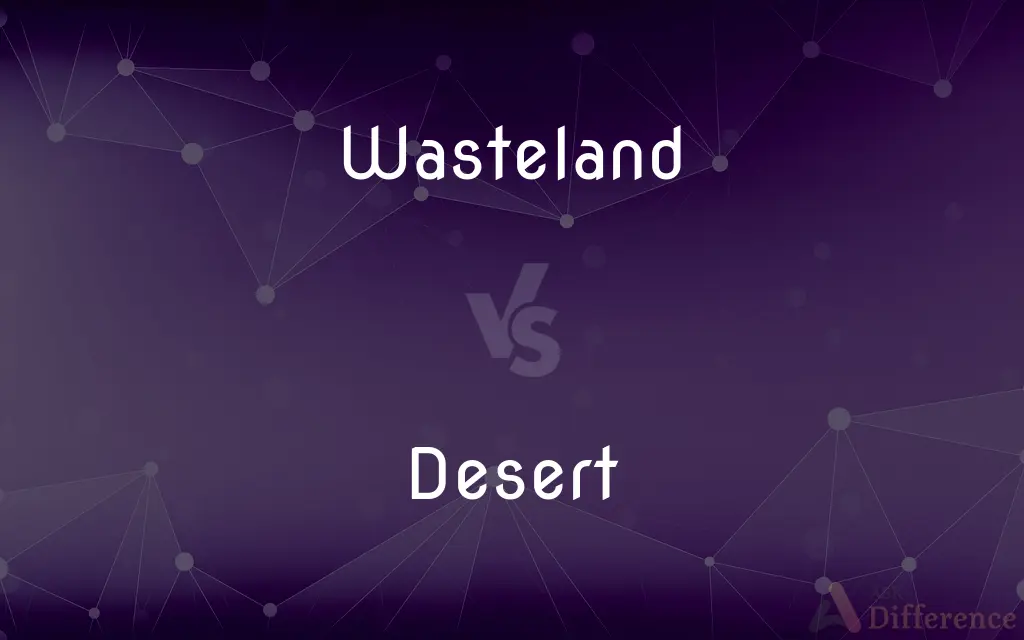Wasteland vs. Desert — What's the Difference?
Edited by Tayyaba Rehman — By Fiza Rafique — Updated on April 4, 2024
A wasteland is a barren, unproductive land, often due to degradation, while a desert is a specific biome characterized by low precipitation, not necessarily barren in biodiversity.

Difference Between Wasteland and Desert
Table of Contents
ADVERTISEMENT
Key Differences
Wastelands are typically areas that have become incapable of supporting significant life due to factors like pollution, deforestation, or other forms of environmental degradation. These lands are often seen as desolate, lacking in vegetation and wildlife, and are the result of human activities or natural disasters. In contrast, deserts are naturally occurring ecosystems that receive less than 250 mm of rain per year, characterized by their dry conditions, but they can support a wide range of life adapted to these conditions, including plants, animals, and humans.
The concept of a wasteland often carries a negative connotation, implying damage or neglect that has led to its barren state. It suggests a land that was once productive but has been rendered useless by various factors. On the other hand, deserts are recognized for their unique ecological balance and the diverse adaptations of their inhabitants, highlighting a natural resilience to harsh, arid conditions.
Wastelands may occur anywhere human activity or natural catastrophes disrupt the land to the point of ecological collapse. They are not confined to any specific climate or region and can be rehabilitated with effort and time. Deserts, however, are specific to regions where precipitation is minimal, and their existence is a result of long-term climatic and geographical processes, making them a critical part of the planet's ecosystem.
Reclamation and rehabilitation efforts in wastelands focus on restoring soil health, reintroducing vegetation, and mitigating the effects of pollution or erosion. Conversely, conservation efforts in deserts aim to preserve the natural ecosystem, including protecting native species and managing water resources wisely to maintain the balance of these fragile environments.
The distinction between wastelands and deserts highlights the difference between land degraded by external influences and a biome that is naturally arid. While wastelands reflect a loss of productivity and ecological function, deserts exhibit a different kind of ecological equilibrium, adapted to scarcity of water.
ADVERTISEMENT
Comparison Chart
Definition
Land degraded by environmental factors.
A biome with low precipitation.
Cause
Human activity, natural disasters.
Climatic conditions, geographical location.
Biodiversity
Generally low, due to degradation.
Varied, adapted to arid conditions.
Connotation
Negative, implying damage or neglect.
Neutral, focusing on natural conditions.
Rehabilitation
Possible through restoration efforts.
Focus on preservation of natural state.
Compare with Definitions
Wasteland
Degraded land, often barren.
The chemical spill turned the area into a wasteland.
Desert
A dry biome with sparse rainfall.
The Sahara is the largest hot desert in the world.
Wasteland
Can be rehabilitated.
Efforts are underway to plant trees in the wasteland.
Desert
Home to specially adapted species.
Cacti have evolved to store water in the desert.
Wasteland
Result of pollution or deforestation.
Deforestation has created a wasteland where forests once stood.
Desert
Found in specific climatic zones.
Deserts are typically found in subtropical latitudes.
Wasteland
Reflects human impact.
The abandoned mine left a wasteland behind.
Desert
Focus on conservation.
Conservation efforts in deserts include protecting endangered species.
Wasteland
Not specific to any climate.
Wastelands can be found in both temperate and tropical regions.
Desert
Characterized by extreme temperatures.
Desert temperatures can swing from very hot to very cold.
Wasteland
Land that is desolate, barren, or ravaged.
Desert
A desert is a barren area of landscape where little precipitation occurs and, consequently, living conditions are hostile for plant and animal life. The lack of vegetation exposes the unprotected surface of the ground to the processes of denudation.
Wasteland
Something that is lacking in intellectual or cultural substance
A critic who considers pop music a cultural wasteland.
Desert
Abandon (a person, cause, or organization) in a way considered disloyal or treacherous
We feel our public representatives have deserted us
Wasteland
A place with no remaining resources; a desert.
Ten years of drought had left the area a wasteland.
Desert
A waterless, desolate area of land with little or no vegetation, typically one covered with sand
The desert of the Sinai peninsula is a harsh place
Drought and deforestation are turning fragile grasslands into desert
Wasteland
Any barren or uninteresting place.
After his experiences, he no longer found western Kansas such a wasteland.
Desert
A flock of lapwings
A desert of lapwings rises from a ploughed field
Wasteland
A devastated, uninhabitable area.
Desert
Like a desert
Overgrazing has created desert conditions
Wasteland
An uninhabited wilderness that is worthless for cultivation;
The barrens of central Africa
The trackless wastes of the desert
Desert
A dry, often sandy region of little rainfall, extreme temperatures, and sparse vegetation.
Desert
A region of permanent cold that is largely or entirely devoid of life.
Desert
An apparently lifeless area of water.
Desert
An empty or forsaken place; a wasteland
A cultural desert.
Desert
(Archaic) A wild and uninhabited region.
Desert
Often deserts Something that is deserved or merited, especially a punishment
They got their just deserts when the scheme was finally uncovered.
Desert
The state or fact of deserving reward or punishment.
Desert
Of, relating to, characteristic of, or inhabiting a desert
Desert fauna.
Desert
Wild and uninhabited
A desert island.
Desert
To leave empty or alone; abandon.
Desert
To withdraw from, especially in spite of a responsibility or duty; forsake
Deserted her friend in a time of need.
Desert
To abandon (a military post, for example) in violation of orders or an oath.
Desert
To forsake one's duty or post, especially to be absent without leave from the armed forces with no intention of returning.
Desert
That which is deserved or merited; a just punishment or reward.
Desert
A barren area of land or desolate terrain, especially one with little water or vegetation; a wasteland.
Desert
(figuratively) Any barren place or situation.
Desert
Usually of a place: abandoned, deserted, or uninhabited.
They were marooned on a desert island in the Pacific.
Desert
To leave (anything that depends on one's presence to survive, exist, or succeed), especially when contrary to a promise or obligation; to abandon; to forsake.
You can't just drive off and desert me here, in the middle of nowhere.
Desert
To leave one's duty or post, especially to leave a military or naval unit without permission.
Anyone found deserting will be punished.
Desert
That which is deserved; the reward or the punishment justly due; claim to recompense, usually in a good sense; right to reward; merit.
According to their deserts will I judge them.
Andronicus, surnamed PiusFor many good and great deserts to Rome.
His reputation falls far below his desert.
Desert
A deserted or forsaken region; a barren tract incapable of supporting population, as the vast sand plains of Asia and Africa which are destitute of moisture and vegetation.
A dreary desert and a gloomy waste.
Desert
A tract, which may be capable of sustaining a population, but has been left unoccupied and uncultivated; a wilderness; a solitary place.
He will make her wilderness like Eden, and her desert like the garden of the Lord.
Before her extendedDreary and vast and silent, the desert of life.
Desert
Of or pertaining to a desert; forsaken; without life or cultivation; unproductive; waste; barren; wild; desolate; solitary; as, they landed on a desert island.
He . . . went aside privately into a desert place.
Full many a flower is born to blush unseen,And waste its sweetness on the desert air.
Desert
To leave (especially something which one should stay by and support); to leave in the lurch; to abandon; to forsake; - implying blame, except sometimes when used of localities; as, to desert a friend, a principle, a cause, one's country.
Desert
To abandon (the service) without leave; to forsake in violation of duty; to abscond from; as, to desert the army; to desert one's colors.
Desert
To abandon a service without leave; to quit military service without permission, before the expiration of one's term; to abscond.
The soldiers . . . deserted in numbers.
Desert
An arid region with little or no vegetation
Desert
Leave someone who needs or counts on you; leave in the lurch;
The mother deserted her children
Desert
Desert (a cause, a country or an army), often in order to join the opposing cause, country, or army;
If soldiers deserted Hitler's army, they were shot
Desert
Located in a dismal or remote area; desolate;
A desert island
A godforsaken wilderness crossroads
A wild stretch of land
Waste places
Common Curiosities
Can wastelands be restored?
Yes, wastelands can often be restored through efforts like soil rehabilitation, reforestation, and pollution cleanup.
Are all deserts hot?
Not all deserts are hot; some, like the Gobi in Asia, experience cold winters, showing that deserts are defined by dryness, not temperature.
What causes an area to become a wasteland?
Factors include pollution, overuse of land, deforestation, and other forms of environmental degradation.
What efforts are made to conserve deserts?
Conservation efforts include protecting native species, managing water resources, and limiting human impact on these sensitive ecosystems.
Is there biodiversity in deserts?
Yes, deserts support a diverse range of life, including plants, animals, and microbes that have adapted to the arid conditions.
What defines a desert?
A desert is defined by its low precipitation, receiving less than 250 mm of rain per year, and can support life forms adapted to these conditions.
How do humans live in desert regions?
Humans in desert regions often adapt their lifestyle, agriculture, and water usage to the arid conditions, sometimes using irrigation and other technologies.
How do desert plants survive with so little water?
Desert plants have adaptations like deep root systems, water storage in leaves, and reduced leaf surface area to minimize water loss.
Can deserts form near the equator?
While less common, deserts can form near the equator, especially in rain shadow regions or where cold ocean currents reduce evaporation.
What's the difference between natural desertification and wastelands?
Desertification is the process of fertile land becoming desert typically due to drought, deforestation, or inappropriate agriculture, while wastelands are areas degraded by environmental damage or neglect.
Share Your Discovery

Previous Comparison
Incubator vs. Autoclave
Next Comparison
Sin vs. ViceAuthor Spotlight
Written by
Fiza RafiqueFiza Rafique is a skilled content writer at AskDifference.com, where she meticulously refines and enhances written pieces. Drawing from her vast editorial expertise, Fiza ensures clarity, accuracy, and precision in every article. Passionate about language, she continually seeks to elevate the quality of content for readers worldwide.
Edited by
Tayyaba RehmanTayyaba Rehman is a distinguished writer, currently serving as a primary contributor to askdifference.com. As a researcher in semantics and etymology, Tayyaba's passion for the complexity of languages and their distinctions has found a perfect home on the platform. Tayyaba delves into the intricacies of language, distinguishing between commonly confused words and phrases, thereby providing clarity for readers worldwide.














































